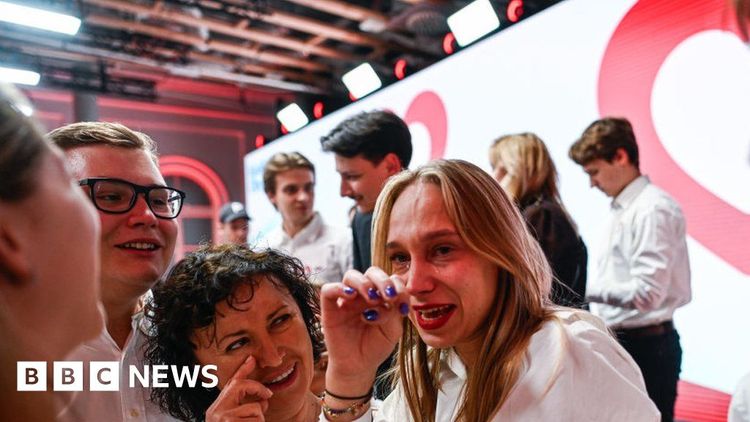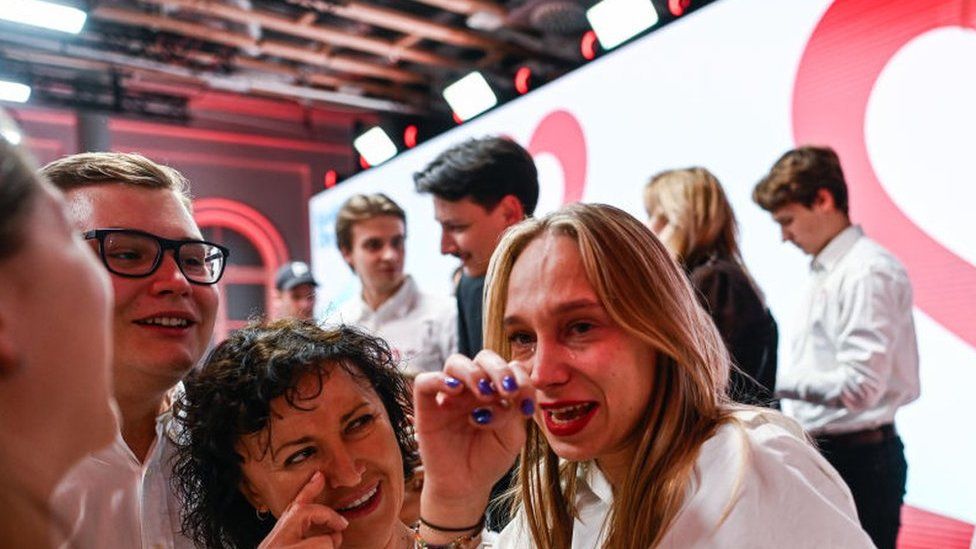Polish election: EU looks to welcome back Poland after years of antagonism

Omar Marques/Getty Images is where we obtained the image source used in this blog.
Supporters of the Civic Coalition were extremely happy and excited about their victory in the vote that took place on Sunday.

The results of Poland's election according to the exit polls are making Eurocrats very happy. They are smiling broadly like the Cheshire cat.
Poland's centrist opposition Civic Coalition, which was previously distant and hostile towards Brussels, now wants to communicate a clear message: "We are making a comeback as the fifth-largest country in the EU."
The European Union has faith in the group because they are being led by ex-European Council leader Donald Tusk.
The city of Brussels had expressed great concern regarding the outcome of Poland's election.
Very few statements were made publicly. European Union officials did not wish to appear as if they were meddling in the voting process of individual nations. However, numerous EU officials were privately anxious about the outcome of the election.
Poland and Hungary have been perceived as the rebels of the EU for quite some time now. They are believed to have imperfect democracies and are not friendly towards the EU.
They were charged with violating the democratic standards of the bloc.
The European Union decided not to give significant amounts of money to Poland. They did this because they believed that the Polish government was wrong to take away women's rights to decide about their own bodies. The government had made abortion almost illegal. The EU also thought that the government was threatening the courts' independence, as well as the freedom of the press, because they had taken control of the state broadcaster.
Hungary and Poland have consistently opposed the implementation of new EU-wide policies to address migration and the achievement of the EU's ambitious climate targets.
Up until now, there is only an evaluation conducted before people leave, but Brussels is extremely happy about the predicted result since it appears to be going against a worrisome trend for the EU - the supposed revival of the anti-EU radical right-wing in most areas of the group.
Right-wing parties are gaining a lot of support in France, Austria and Germany. Populist politicians were recently victorious in Slovakia's elections.
The picture is provided by MARTIN DIVISEK from EPA-EFE/REX/Shutterstock.
Robert Fico, who won the election in Slovakia, plans to decrease the amount of support given to Ukraine's military.
The Civic Coalition has pledged to get back into the European mainstream. However, this won't be a simple task. The existing Law and Justice party, which is known for their rigid conservative views, is predicted to hold a considerable number of parliamentary seats, leaving little space for Poland's fresh government to make any significant changes.
Despite the challenging situation with Poland, European Commission Vice-President Margaritis Schinas remained optimistic during our conversation. He expressed his hope that the current tensions would ease and described Poland as an essential member of the European community.
Brussels wants to improve its relationship with Poland by considering Russia's influence. Moscow views any split among Ukraine's supporters abroad as favorable to their interests.
Regardless of who won the election on Sunday, Warsaw's firm stance against Russia was not expected to weaken.
This is a long-standing adversarial relationship. From this point of view, Nato was more relaxed about the outcome of Poland's election than the EU. Since the invasion of Ukraine by Russia, Warsaw has become more involved in the military alliance in a prominent manner.
The US ambassador to Nato, Julianne Smith, shared with me her observation during her trips to Poland. She noticed that the Polish citizens, not only the government, have a strong commitment to provide ongoing support for Ukraine.
"They are situated close by; they are adjacent to Ukraine, thus they experience this conflict in a unique way compared to other allies within the alliance."
This issue is closely related to their everyday existence. Hence, I am of the opinion that we can rely on Poland. We are quite at ease with depending on them in the future, regardless of who holds the position of authority.
Before Donald Trump's presidency, the US government was already disappointed with its European allies because they were not investing enough in their national defense. The US is happy that Poland is allocating 3% of its Gross Domestic Product to enhance its security, and it is not expected that the Civic Coalition will change this policy.
Actually, Poland is extremely concerned that the conflict in Ukraine could spread into its territory, which is why it recently declared its intention to enhance its military strength by investing in adequate resources and manpower. By 2026, Poland aims to develop its army to the point where it becomes the most powerful military force in Europe.























































